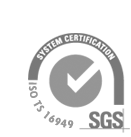Benefits of Aluminum

The most abundant metal, and the third most abundant element, aluminum makes up about 8% of the Earth's crust by weight. Aluminum is highly chemically reactive, making it a rare metal in its native form. Instead, aluminum is found combined in over 270 different minerals, the most common being bauxite.
In its pure form, aluminum naturally forms a thin outer layer of aluminum oxide when in contact with oxygen through a process called oxidation. This surface layer creates a barrier to further oxidation, as well as corrosion. Aluminum alloys however, provide little protection from corrosion. As a result, aluminum in its alloy form must be passivated by either alclading, chromate conversion coating, or anodizing to prevent corrosion.
Aluminum's unique characteristics make it an extremely versatile material for a wide spectrum of industries. A low density, and high yield strength (200MPa to 600MPa for aluminum alloys) aluminum is an extremely durable metal, while remaining lightweight, ductile, and malleable.
Extruded aluminum offers many attributes, making it the choice for a wide range of industries and markets. Aluminum...
- ...is nonmagnetic
- ...is an excellent thermal conductor
- ...does not emit sparks
- ...conducts electricity
- ...is noncombustible
- ...is reflective
- ...is nontoxic
- ...is cryogenically strong
- ...is recyclable
- ...has a high strength to weight ratio
- ...can be manipulated into complex shapes with tight tolerances
- ...can be machined easily
- ...bends and forms easily

